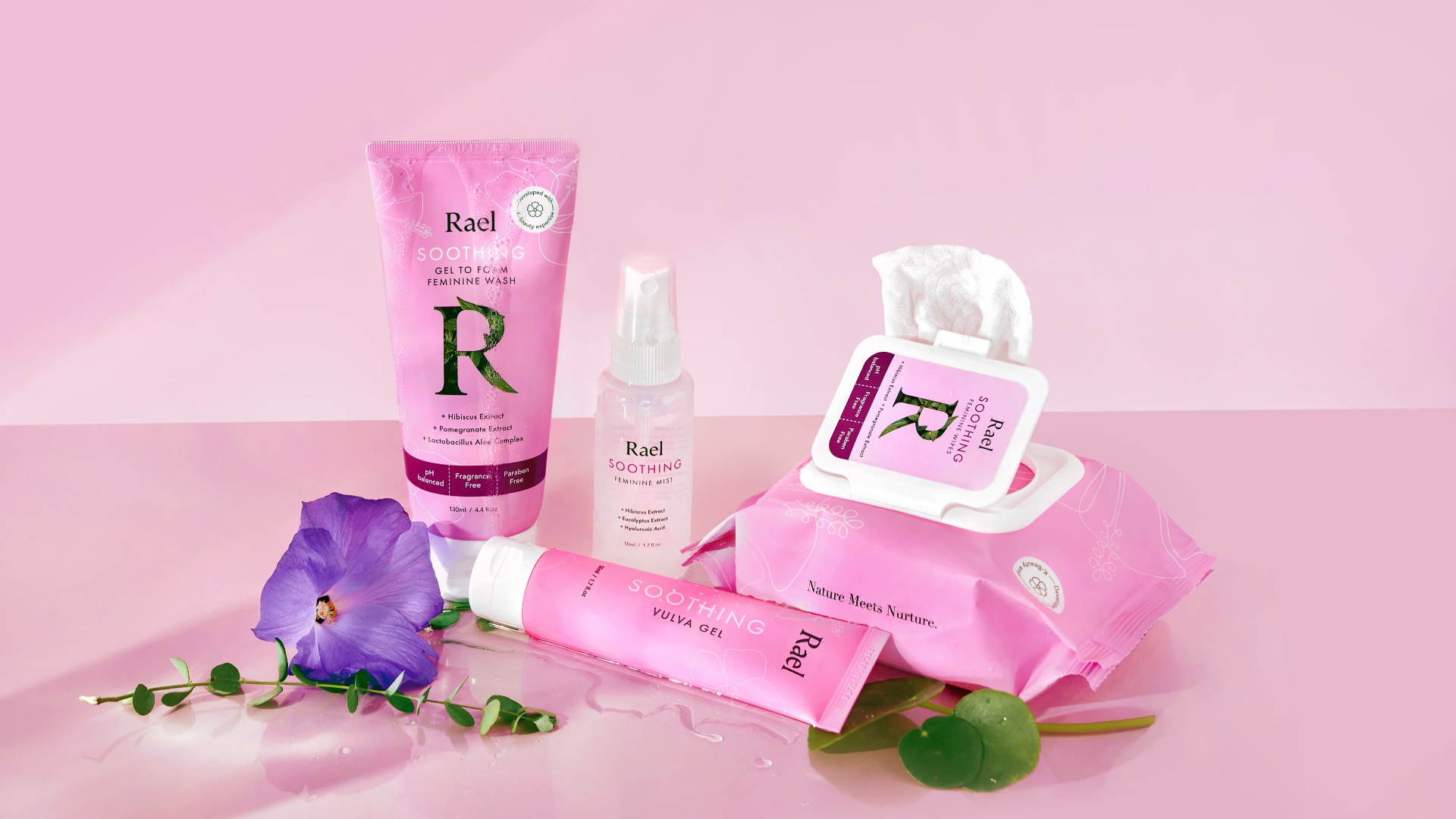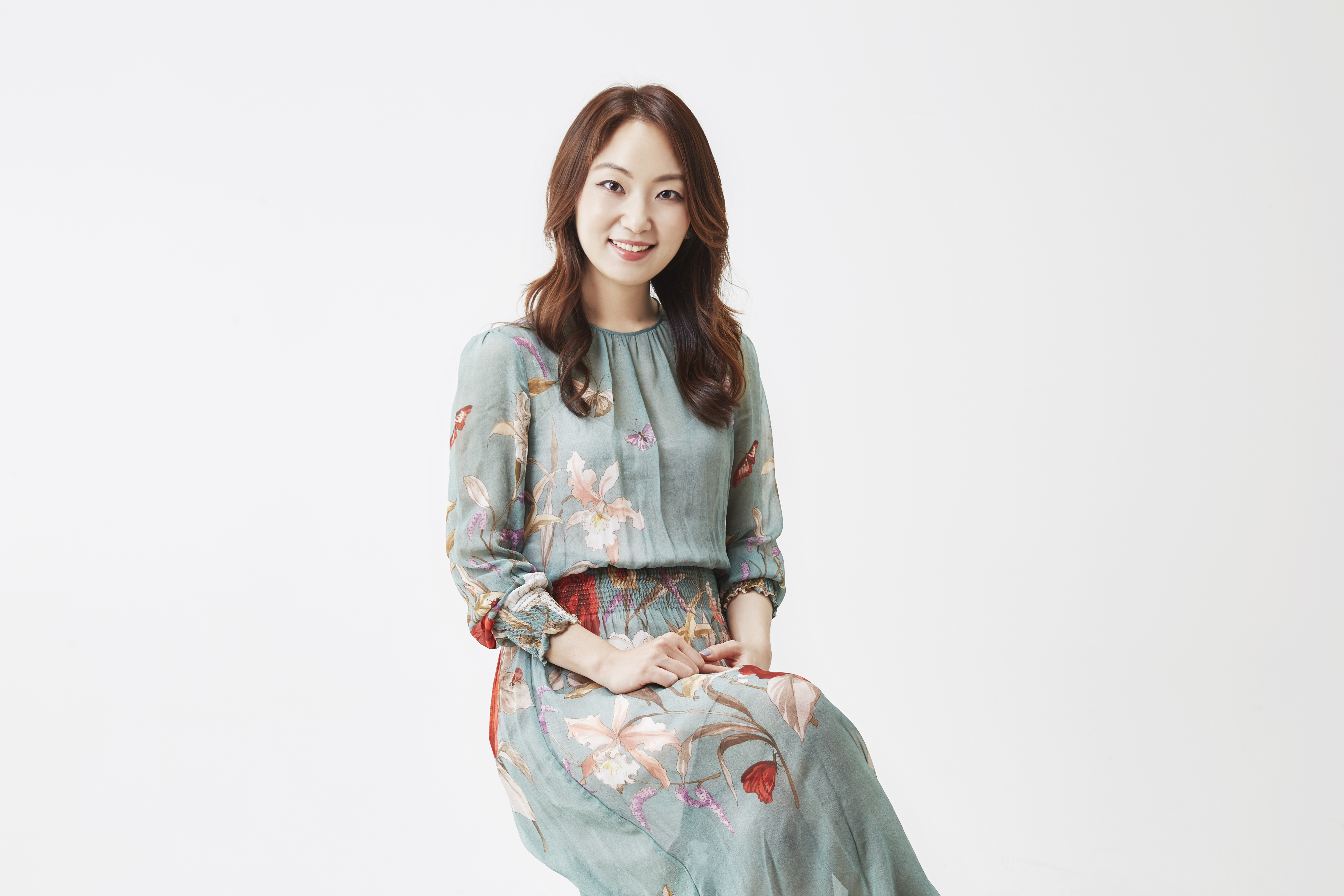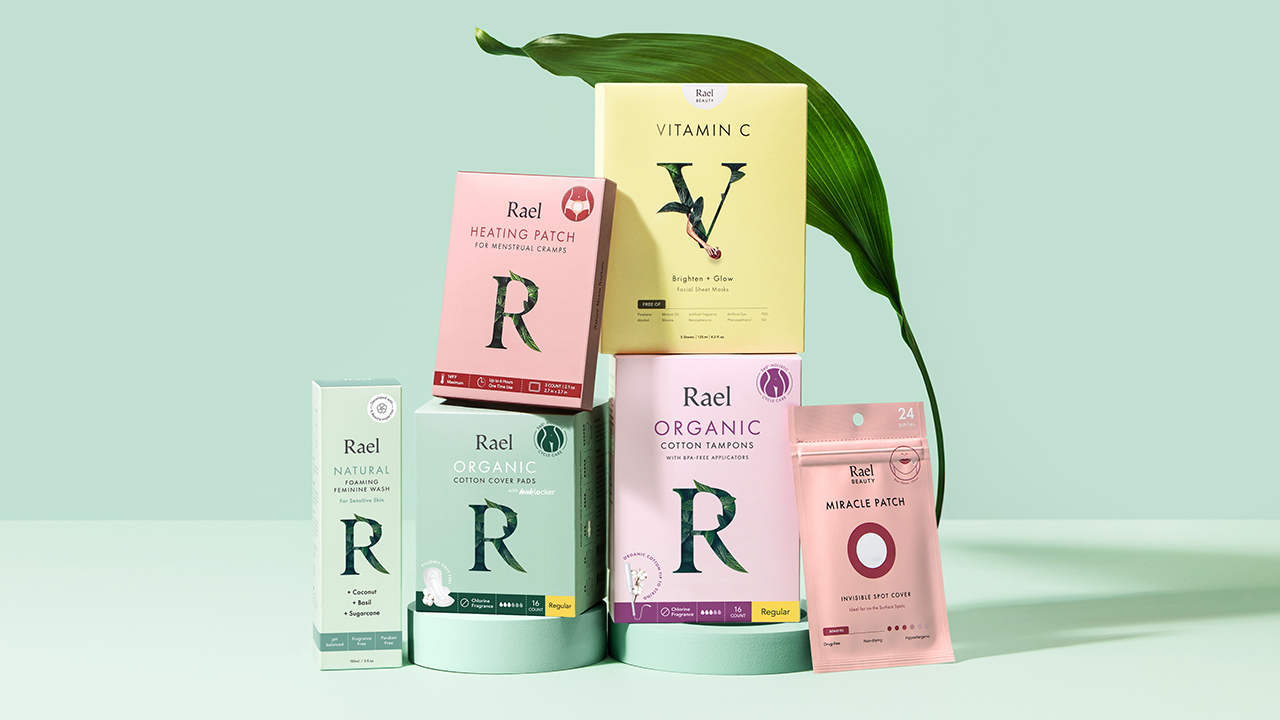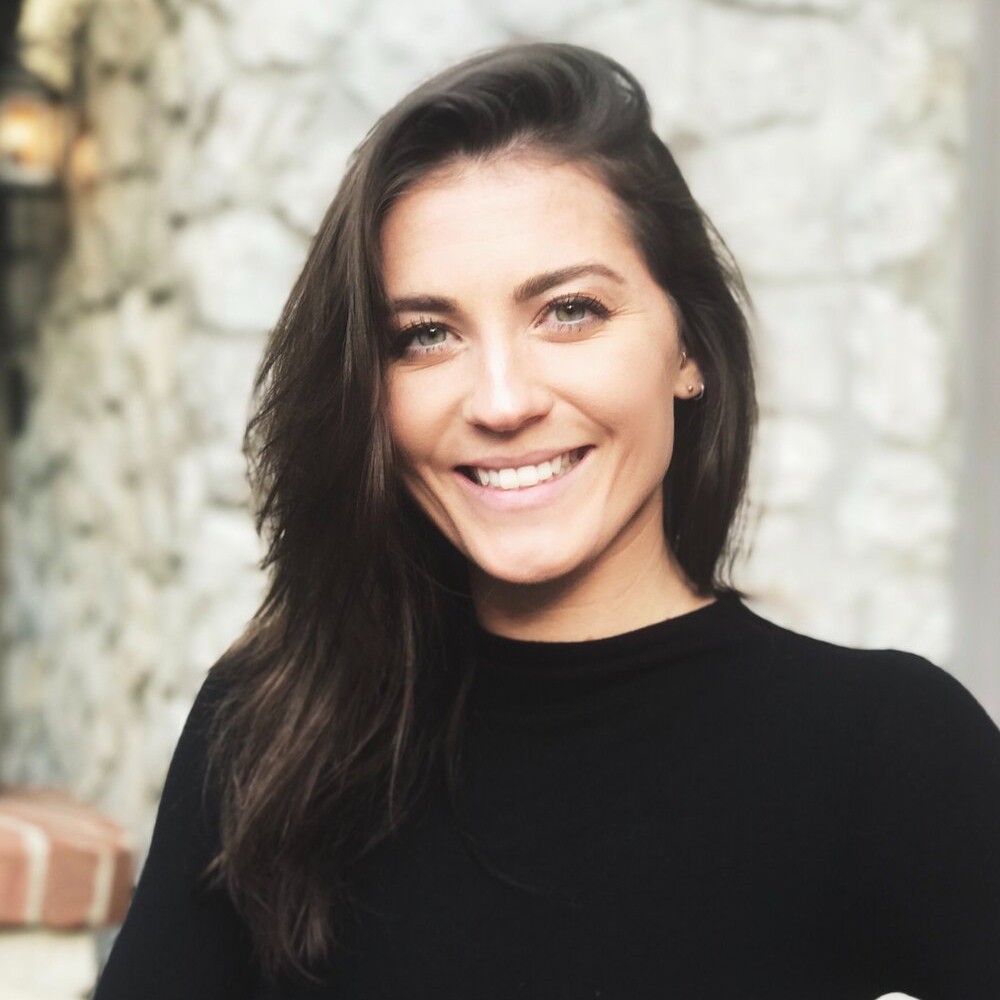K-Beauty for Your Vulva? How Rael Applies South Korean Innovation to Intimate Care
The Rael founders, who recently raised $35 million in venture funding, are disrupting the feminine hygiene care industry, including ending the male-dominated CPG industry’s push to make our vaginas \201csmell like flowers.\201d


K-beauty, or Korean skincare and cosmetics, has ingrained itself in our global beauty lexicon. And, as far as Rael is concerned, it’s for more than just our face.
You’ve likely seen Rael—the holistic personal care brand with minimalist, pastel packaging—on the shelves at your local CVS, Walgreens, Target, or Walmart. The brand was founded by three South Korean women who, after moving to the U.S., noticed a discrepancy in effective, healthy, and clean feminine care products. In the States, there is no law requiring brands to disclose ingredients for menstrual products. According to the National Center for Health Research, low levels of toxic chemicals dioxin and rayon have been found in non-organic tampons. Organic, natural feminine care in South Korea accounts for 30 percent of the market, while in the U.S., it’s less than 10 percent, per Rael.
The company's cofounders Aness An, Binna Won, and Yanghee Paik, tapped into the new desires of the American consumer, who increasingly seek non-toxic ingredients, sustainable packaging, give-back initiatives, and transparency. Within three months of launching on Amazon in 2017, the brand became the bestselling product in the organic feminine care category, thanks to its high-performing organic pads and tampons.
In a conversation with Marie Claire, CEO Yanghee Paik admits that Rael entered a category in the midst of disruption, with strong startup competitors like Cora and Lola. But Rael is taking its own approach by pairing South Korean manufacturing technology with U.S.-derived organic cotton to create best-in-class care for women.
There have been a lot of artificial fragrances added to feminine care products to make our intimate parts smell like flowers. That is another stigma that we're trying to really remove.
Yanghee Paik

K-Beauty Boss: Rael CEO and cofounder Yanghee Paik wants to create a new standard of feminine care.
“In Korea, there have been a lot of innovations with the technology in feminine care,” Paik says. “We are used to using higher quality, higher performing, and more comfortable products.” Rael sources organic cotton from Texas, and manufactures in Korea using its novel technology, which includes Leak Lockers, or indentations in the center and side panels to prevent overflow. There is also a middle panel—the Super Absorbent Core—that instantly absorbs blood. Tampons are made with an organic cotton protective veil, which prevents tampon shedding and fiber loss. Paik says most competitors lack the veil or the veil isn’t organic cotton. Rael applicators are also plant-based and BPA-free.
“The organic cotton material we use is very clean because there is proof that for at least three years, they have not applied any pesticides to the plant and soil the cotton grows in,” Paik says.
Rael’s product lineup also includes period panties, menstrual cups, heating patches, skincare, body care, acne care, and vulva care. Fragrance- and chlorine-free feminine wash, relief gel, feminine mist, and wipes make up its Soothing Vulva Care Collection—marketed as “K-beauty care for down there.”
Get exclusive access to fashion and beauty trends, hot-off-the-press celebrity news, and more.
What many people—yes, even some women—refer to as the vagina is actually the vulva. (The vulva is the outer part of the female genitals, and the vagina is located inside your body.) Unlike douching, which the American College of Obstetricians and Gynecologists (ACOG) does not recommend, vulva care focuses on addressing problems like itchiness, irritation, and dryness. These issues often result from routine activities, like sex, exercise, and using soaps with artificial fragrances. Rael's vulva care line treats these ailments using common natural K-beauty ingredients, like hyaluronic acid, mugwort, cica, and lactobacillus aloe complex.
“We’re using Korean botanicals that we traditionally use in Korea for vulva care,” Paik says. “We’re approaching feminine hygiene, or intimate care, the way that we approach skincare in K-beauty.”
When asked who should use vulva care, Paik says just about anyone, as general body wash can contain fragrances that can disrupt the natural pH balance of the vagina. High vaginal pH puts women at risk for bacterial vaginosis, a bacterial overgrowth that causes an unpleasant odor, according to Healthline.
Dr. Shamsah Amersi, a Los Angeles-based OB-GYN who collaborated with Rael on the launch of its vulva care products, says that the lactobacillus aloe complex found in Rael’s products helps maintain the ideal pH balance of between 3.5 and 5. She advises her patients to seek organic feminine care that doesn't have synthetic ingredients.
However, Jen Villavicencio, M.D., a lead for equity transformation at ACOG and a practicing OB-GYN in Washington D.C., is skeptical about products that claim to balance vaginal pH. “The bacterial flora of the vagina is a delicate balance that naturally protects the vagina,” says Dr. Villavicencio. “Cleansing the vagina by any means threatens that balance and potentially increases the risk for vaginal infections, vaginitis, and even vaginal injury.
“If someone is experiencing unusual vaginal symptoms such as itching, increased discharge, or a new odor, we recommend they seek the counsel of a healthcare professional that can appropriately diagnose and recommend treatment. For routine vulvar hygiene, we recommend using water or unscented soaps and only for external use.”
Women should seek vaginal-related products that disclose the pH of the product itself, says Alpha Medical’s chief medical officer Dr. Mary Jacobsen, an OB-GYN who studied at Stanford, though, unfortunately, many do not. The pH of Rael's Soothing Feminine Wash—which can be used all over the body—is between 4.5 and 5.5, to help maintain a healthy pH level for the vulva area.
We want to educate consumers that they don't have to smell something other than our natural odor. We can keep it very natural.
Yanghee Paik

Rael aims to refine feminine care, with a touch of K-Beauty botanicals.
Rael shuns the idea of covering up your natural odor with artificial flower scents found in many feminine hygiene products—which also irritates the vulva—and suggests instead embracing your natural scent while increasing hydration.
“There have been a lot of artificial fragrances added to feminine care products to make our intimate parts smell like flowers,” Paik says. “That is another stigma that we're trying to really remove. We want to educate consumers that they don't have to smell something other than our natural odor. We can keep it very natural and don't have to put any fragrances into our body.” Paik adds that products encouraging your lady parts to smell like flowers were a result of the male-dominated CPG industry.
Paik and her co-founders are breaking norms in ways beyond their product line. In 2018, Rael raised $17.5 million in Series A funding, and just this year, $35 million in Series B—the largest investment in the category to date. Although the feminine care industry is valued at $4 billion, it has been largely ignored by the innovation economy. Case in point: Tampons and pads have more or less used the same design since 1933.
“We are making sure people understand the benefits of using organic natural products,” she says. “If you go to big retailers, you'll see that 80 percent of the aisle is dedicated to conventional products. We want people to know there are better options out there.”

Emma is a freelance writer who specializes in luxury lifestyle and travel, writing about sought-after vacation destinations, private aviation, cruises, wine and spirits, wellness, luxury real estate, men’s and women’s fashion and fine jewelry.